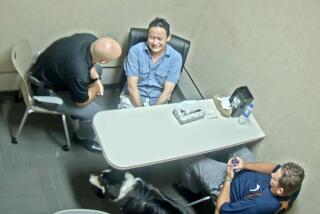Deaf Activists Keep Watch on Police Lawsuit : Civil rights: A request for a sign language interpreter was denied during questioning about a robbery in which the plaintiff was misidentified.
- Share via
When Jeno Koth, a deaf cabinetmaker from Hungary, entered a Pasadena bank in January, 1988, to cash his paycheck, a teller thought that he was the man who had robbed the Wells Fargo branch a week earlier.
Minutes later, Koth was stunned to find himself surrounded by Pasadena police officers who handcuffed him and kept him in jail overnight before they realized they had the wrong man and released him, the 32-year-old Van Nuys resident testified last week. Police, however, testified that their arrest--after two bank employees had identified Koth as a possible robber--was justified.
Koth’s lawyer said another man was arrested two months later and pleaded guilty to the robbery.
In a lawsuit that is being watched closely by deaf activists, Koth is seeking unspecified damages from the Pasadena Police Department for false imprisonment, emotional distress, violation of civil rights and violation of a 1973 federal law that grants special rights to handicapped people.
Testimony is to resume Tuesday in the trial, which began last week in Alhambra Superior Court.
While Koth was in custody, Pasadena officers denied his repeated requests for a sign language interpreter, he said. They demanded answers to written questions but never informed him of his Miranda rights concerning self-incrimination and legal help, he asserted.
Investigator Lionel Salgado, who interviewed bank employees at the time of Koth’s arrest, testified that he authorized Koth’s release less than an hour after the man was booked because of a lack of evidence. But Salgado added, “He was still a suspect in my mind.”
The investigator said he later learned Koth was kept overnight because another officer believed, from a note by Koth, that the cabinetmaker knew the identify of the robber.
Marcella Meyer, chief executive officer of the Greater Los Angeles Council on Deafness, said through an interpreter that the officers who arrested Koth could easily have obtained a sign language aide through a service called Lifesigns. But she said the Pasadena department, like a number of other Southern California police agencies, had no policy that requires officers to seek special help for a deaf suspect.
“We don’t care if the person was arrested wrongfully or rightfully,” Meyer said. “The point is to make sure that the deaf person has access to communication about what’s happening around him or her.”
Koth’s attorney, John C. Taylor, said Wells Fargo, which was also named in the lawsuit, settled earlier this year, although terms of the settlement can’t be revealed.
Koth testified that he came to the United States in 1981 and was building cabinets at a San Marino home when the bank incident occurred. When he was taken to the Pasadena police station, he recalled in court, “I kept saying, ‘I’m deaf. I’m deaf.’ They laughed. They looked at me and said, ‘Shut up.’ ”
His attorney said Koth is able to read lips only when someone utters a familiar phrase or a brief sentence.
Jurors were shown enlarged copies of the pieces of paper that police used to question the cabinetmaker about the Wells Fargo holdup. At one point, Koth wrote “I know robbery,” then crossed out the end of the word and wrote “ert.”
According to Taylor, a Pasadena officer thought Koth was admitting he knew the bank robber. The officer recommended that Koth be held overnight for further investigation. Koth said he was fingerprinted, photographed, strip-searched and placed in a bare cell.
The immigrant testified that he did not then understand the word robbery. He said he wrote “I know robbery” because he thought the officer was referring to Koth’s employer, who was named Robert.
When he later learned what robbery meant, Koth said, “I was so disgusted. If they had brought in an interpreter, everything would have been cleared up sooner.”
Pasadena police administrators refused this week to discuss the trial or the department’s policy regarding deaf suspects and referred all questions to the department’s attorney, Carol Ann Rohr. After consulting with city officials, Rohr said, “We decline to comment on the case.”
More to Read
Sign up for Essential California
The most important California stories and recommendations in your inbox every morning.
You may occasionally receive promotional content from the Los Angeles Times.













